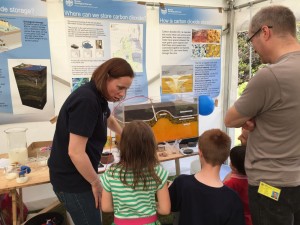Communicating with the public is increasingly an issue for geoscientists both in research and in industry, but how do we deal with communicating those aspects of our work that are controversial? Many scientists shy away from those issues that are likely to draw the attention of an angry public, because, quite reasonably, they don’t want to be attacked for just doing their job. But these controversial or contested aspects of geoscience are becoming more and more visible in our society, from fracking for shale gas, to the new plans to consult on deep geological storage of radioactive waste http://www.nda.gov.uk/rwm/national-geological-screening/consultation/ and the withdrawal of the UK government’s support for Carbon Capture and Storage funding http://www.theguardian.com/environment/2015/nov/25/uk-cancels-pioneering-1bn-carbon-capture-and-storage-competition and as such we have a responsibility to address them. More and more researchers are turning their attention to how the public understand these issues and therefore, how to communicate them, but in order to embrace this issue fully we need to appreciate the experiences of those people who are already communicating these subjects – what are the successes and failures?
In a step towards drawing these groups closer together, we have convened a session at the upcoming European Geoscience Union General Assembly in Vienna in April, focussing on the Communication of Contested Geoscience [http://meetingorganizer.copernicus.org/EGU2016/session/20173]. This session will explore the challenges of communicating the controversial and high-profile geoscience topics that are increasingly discussed in Europe, critique current practice and propose new strategies for public engagement in contested geoscience. We invite participants from across all sectors, including industry and government, to submit abstracts on the communication of new and controversial geological topics (geothermal power, carbon capture and storage or CCS, oil and gas extraction, radioactive waste disposal, etc) within the informal, non-formal and adult engagement sectors, including issues of risk perception, trust, the role of experts and public understanding of science.

We would like to invite you submit an abstract to this innovative PICO session by the deadline for abstracts, which is Wednesday 13th January at 13.00 CET. If you are unfamiliar with a PICO session it combines the best parts of a poster and oral presentation, by having a short oral to present the highlights of your findings, with a poster style interactive session using your whole digital presentation on touch screens beside the posters. This allows you to capture your audience’s attention quickly, but then go into as much or as little detail than is possible on a poster.
For more information on submitting an abstract, please see here: [http://egu2016.eu/abstract_management/how_to_submit_an_abstract.html].

